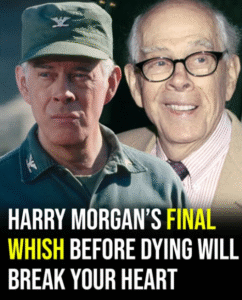Few actors have left such a profound mark on television history as Harry Morgan, the beloved star best known for his role as Colonel Sherman T. Potter on MASH*. His commanding presence, gentle humor, and unshakable integrity made him one of the most beloved father figures in American television. But beyond his career, Harry Morgan was a man of deep kindness, humility, and quiet leadership. In his later years, as his life drew to a close, his final wish reflected the same decency and warmth that defined both his character and his spirit—a wish that his legacy be remembered not for fame or awards, but for humanity.
This is the story of Harry Morgan’s extraordinary life, the values that guided him, and the lasting impact of a man who brought heart and wisdom to millions.
A Humble Beginning
Harry Morgan was born Harry Bratsberg on April 10, 1915, in Detroit, Michigan. His parents were of Norwegian descent, and he grew up in a working-class household where hard work and honesty were daily lessons. Initially, he didn’t plan to become an actor. After graduating from Muskegon High School, he attended the University of Chicago with the intention of studying law. But fate had other plans.
While at college, Morgan became involved in theater productions and discovered a natural gift for performance. His ability to convey sincerity and emotion drew the attention of others, and he soon joined a theater group in New York City. It was during this time that he changed his name from Bratsberg to Morgan—simpler to pronounce, yet still reflective of his unpretentious roots.
In the late 1930s and early 1940s, Morgan began appearing in stage plays, eventually catching Hollywood’s eye. He moved west, where his understated acting style stood out in an era dominated by dramatic stars and leading men.
Building a Career in Character
Harry Morgan never sought to be the handsome leading man or the headline name on the marquee. He found his calling as a character actor—someone who could bring authenticity and subtle power to any role. His early film career included appearances in classics like The Ox-Bow Incident (1943) alongside Henry Fonda, a role that showcased his quiet intensity and moral conviction.
Over the next two decades, Morgan built a reputation as one of Hollywood’s most reliable performers. He appeared in more than 100 films, including High Noon (1952), Inherit the Wind (1960), and Support Your Local Sheriff! (1969). Directors and actors loved working with him because he brought a grounding realism to every scene—he was the type of actor who made everyone around him better.
In television, Morgan found his second great home. He starred in the long-running police comedy Dragnet with Jack Webb, where his calm, authoritative demeanor became a defining feature of his career. Yet it was his next major role that would transform him from a respected actor into a television legend.
Colonel Potter and the Soul of MASH*
When Harry Morgan joined the cast of MASH* in 1975, the show was already a hit. Taking over the position of commanding officer after McLean Stevenson’s departure, Morgan faced a challenge: to make Colonel Sherman Potter his own, while honoring the show’s unique mix of humor and heartbreak.
He succeeded brilliantly.
Unlike his predecessor, who played the commander with eccentric flair, Morgan’s Colonel Potter was grounded, compassionate, and wise. A career military man, he carried the weight of war with quiet dignity. Potter was the kind of leader who could scold his subordinates one moment and share a drink with them the next. His folksy wisdom, painted with lines like “Horse hockey!” and “Mule muffins!”, gave MASH* both comic relief and moral depth.
But what truly endeared Morgan to audiences was the heart he brought to the role. He wasn’t playing a caricature of military authority; he was playing a human being who loved his comrades, mourned the loss of youth, and longed for home. Offscreen, his fellow cast members often remarked that Morgan was much the same in real life—wise, humble, and full of quiet humor.
Alan Alda once described him as “the rock of the show.” Loretta Swit called him “a father figure to us all.” Even decades later, reruns of MASH* still resonate, and much of that warmth comes from Morgan’s portrayal of a man who led with empathy, not ego.
A Man of Kindness and Integrity
Beyond the cameras, Harry Morgan was a devoted family man. He was married twice—first to Eileen Detchon, with whom he shared four sons, and later to Barbara Bushman Quine. He was known by friends and neighbors as a man who valued simplicity and loyalty over fame. He rarely sought attention and often shied away from Hollywood’s glamorous trappings.
Those who knew him best described him as gentle but strong—a man who listened more than he spoke and led by example. He was deeply involved in charitable work, supporting veterans’ organizations and children’s hospitals quietly and without publicity. Even late in life, he often sent handwritten notes to fans who wrote to him, thanking them for their support.
He carried that same generosity onto the set. Co-stars remembered how he encouraged younger actors, never pulling rank despite his seniority. When someone struggled through a line or scene, Morgan offered reassurance instead of criticism. “He made everyone feel capable,” said one MASH* crew member. “He made the work feel meaningful.”
The Final Years and His Last Wish
Harry Morgan continued to work into his later years, appearing in television films and guest roles through the 1990s. Yet as he aged, he became increasingly reflective about his long career. In interviews, he often emphasized that what mattered most to him wasn’t the fame or the applause—it was the relationships he built along the way.
In his final years, surrounded by family, Morgan expressed one enduring wish: that people remember him not just as Colonel Potter, but as someone who lived with kindness and purpose. “If people think of me,” he once said, “I hope it’s because I made them smile, or made them feel that someone understood.”
When Harry Morgan passed away on December 7, 2011, at the age of 96, tributes poured in from fans and colleagues around the world. Alan Alda called him “a treasure,” and Mike Farrell described him as “a man of extraordinary decency.” His funeral was private, per his request, but fans honored him across social media and through countless re-airings of MASH* episodes that reminded them of his humanity.
A Legacy of Leadership and Heart
Harry Morgan’s legacy is one of quiet strength. In an era when celebrity often equates to spectacle, he stood for humility and sincerity. He proved that leadership—both on screen and in life—comes not from commanding attention, but from earning respect.
Through MASH*, he helped shape television’s understanding of what a leader looks like: compassionate, flawed, but deeply human. His characters never shouted for authority—they earned it through wisdom and empathy.
And that, in many ways, was Harry Morgan’s greatest gift.
He taught us that kindness is not weakness, that humor can heal, and that even in the chaos of war—or life—it’s possible to lead with heart. His performances continue to comfort and inspire, reminding generations that the truest measure of greatness lies not in power or fame, but in how we treat others.
Harry Morgan’s final wish was simple: to be remembered as a good man.
And in that, he succeeded beyond measure.


